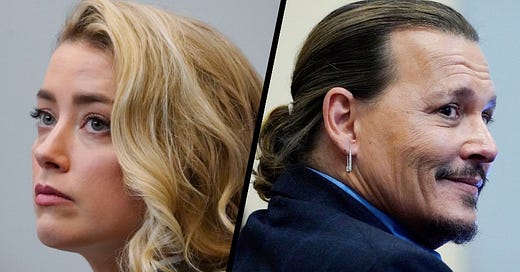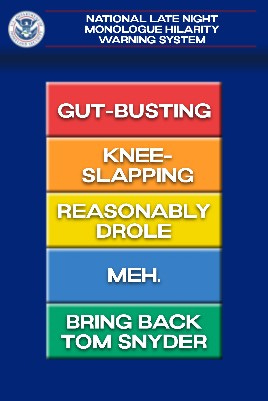Is the Way We Talk About Trials Maybe a Little Bit Incredibly Fucked Up?
Who made us the experts?
Let me be clear: I would never, ever stand in the way of anyone’s right to gawk at celebrities as they bedevil each other with revenge poops and cut off each others’ fingers. The right to rubberneck as a glamorous couple reveals their life to be a nuclear train wreck is far more valuable than some of our crappier constitutional rights; I’d happily trade freedom from quartering soldiers for a front row seat to the Depp v. Heard Schadenfreude Super Bowl. Nothing in this article should be interpreted as an infringement on anyone’s right to watch with their jaw agape as this five-sided freak show plays out.
Nor am I here to squash anyone’s TV judge fun. Courtroom shows are a staple of daytime TV, whether it’s Judge Judy, Judge Mathis, or Mock Trial with J Reinhold (if you didn’t see that reference coming, then you might need to find a different blog). These shows give us a chance to feel superior as America’s saddest sacks parade their problems in front of the nation. No matter how badly your life is going, you can feel a bit better about yourself by watching two adults scream at each other over a stolen vape pen, or by hearing the world’s-most-obviously-unfaithful husband explain how he ended up naked in a Burger King. These shows strike me as harmless fun; they help us feel good about our lives in much the same way My 600 Pound Life helps us feel good about our bodies.
But I think our habit of forming strong opinions based on casually-followed court proceedings isn’t great. It’s not that I find it tawdry or unseemly; I strongly favor the tawdry and unseemly. My problem is that I think we’re normalizing shallow decisions about things we don’t really know much about. I also think that this habit throws fuel on a tribalism fire that’s already burning out of control.
Let’s be honest: Very few of us are highly informed about the trials that make up our water cooler chat. We typically get our information from short recaps on TV, or we’re going off of what some guys says a lady he knows saw on Twitter — kind of a of Nicki Minaj’s cousin’s swollen balls situation. Our awareness ticks up slightly when someone shits in Captain Jack Sparrow’s bed, at which point CNN covers the case like it’s World Wars Three through Six, and the National Late Night Monologue Hilarity Warning System gets upped to “gut-busting”.
That’s all fine as far as it goes. But snippets and hearsay aren’t a judicial proceeding. The whole point of a trial is to present all of the evidence and have it duly considered. Casual observers are missing pieces; even the most drawn out true crime podcast — and holy shit do most true crime podcasts milk that shit like a farmer on meth — will be incomplete. Anyone who’s not on the jury is missing vital aspects of the process, such as hearing expert testimony, assessing the credibility of witnesses, and giving defendants the Larry David staredown to see if they’re lying.
Most of us don’t even know the law. I confess: Though the Depp/Heard trial is happening in my neck of the woods — it’s in Fairfax, VA near a comedy show I used to do at The Last Bar In America Where You Could Smoke — I know nothing about the relevant law. All those years in Virginia and I never once walked into a library and cracked open Title 18.2 Chapter 9 Article 3 Paragraph 417 of the ol’ Virginia Code — what a complete fucking ignoramus I am! Or maybe you don’t think I’m ignorant; maybe you feel that it’s generally understood that we’re not all walking around with, say, a working knowledge of North Carolina maritime law, or familiarity with tort statues in Minnesota. But if that’s true, then why do any of us ever act like we really know what’s going on? Because knowing the law is kind of the first step towards knowing whether the law’s been broken.
If we acknowledge the obvious reality that none of us really know what we’re talking about, then the habit of asking “what do you think about such-and-such trial?” starts to seem a bit strange. Why are there opinion polls asking whether people side with Depp or Heard? How many people have enough information to make an informed decision? Even the OJ trial — which was probably the high-water mark for public knowledge of a court case — left us with huge gaps. I read Jeffrey Toobin’s book about the trial a few years ago and was stunned by how much I didn’t know or thought I knew that turned out to be wrong. And I considered myself well-informed — I watched Leno’s monologue almost every night in the ‘90s!
Often, high-profile trials are just another excuse to pick sides. Many times, we’re not expressing a well-considered analysis of the facts; we’re just declaring our tribal loyalties. Some people take “Do you believe Johnny Depp or Amber Heard?” to mean “Do you support the man or the woman?” They pick a side based purely on who they identify with. This brainless tribal binary takes many forms: Do you support the cop or the guy he shot? Do you support the company or the worker? Do you like this celebrity’s work enough to overlook their alleged crime or were you not really a fan of their work to begin with and are therefore ready to throw them to the wolves? If any of us was a figure in one of these trials — if our life was hanging in the balance — we’d want people to form opinions based on careful deliberation. But often, people rush to judgement based on preexisting biases and don’t think about it twice.
Supreme Court cases are like that, too. Polls that ask “do you support such-and-such ruling?” are really asking “do you support the policy outcome of such-and-such ruling?” Very few people familiarize themselves with the case law, hear the arguments, and reach a well-reasoned conclusion — you could argue that even the Justices don’t do that. And Justices get paid to hear cases; why on Earth would anyone who wasn’t paid to hear Morgan v. Sundance, Inc. wade through the ocean of relevant statues and form an opinion on the precise limits of arbitration requirements? That’s not something a sane person does. I am most definitely not arguing that the solution here is for us all to become self-taught legal experts; we all have jobs to do, kids to raise, parents to neglect, and intoxicants to ingest to make the whole thing tolerable. If I were to suggest that you should spend your time reading up on Chaplinsky v. New Hampshire, you’d have every right to tell me to go to hell (though Chaplinsky v. New Hampshire would argue that that right is not absolute!).
I think the norms around how we talk about courts cases should change. It should be socially acceptable to say: “I don’t have an opinion about that trial.” We should recognize that admitting ignorance isn’t always ignorance; sometimes, it’s an acknowledgement of the plain fact that we can’t know everything. People who act like they know everything are liars; we shouldn’t applaud them for having shallow opinions. And personally, I’d be okay with never seeing another local news story where they ask random people for their reaction to a trial. The local news should find better ways to kill time — go find a dog who plays the oboe or a kid with no arms who sank a bunch of three-pointers. Focus on the heartwarming non-news filler bullshit that you do so well and leave a bunch of random opinions about Scott Peterson out of it.
I don’t know if Woody Allen is guilty. I didn’t really follow the Jussie Smollett thing. Bill Cosby is going back to trial, but I don’t know the specifics of that. I will learn more about those cases if and when my opinion starts to matter, but until that moment, I’m not going to bother. I can’t know everything, and those are some things I choose to not know. If you’d like to judge me for that, go right ahead. But please at least key “FUCKWIT” into the hood of my car so that we can go on Judge Mathis and argue about it, thus giving people the court-based drama that they crave.






My local news recently featured a hard hitting piece on edible tape that holds burritos closed.
Celeb/Public trials just feel like a version of Marc Andreesen's "Current Thing". When a new Current Thing drops, everyone has to have an opinion. Most NPC's just download what they need to know or say (Is there a team Depp emoji? Gotta get that Ukraine flag next to my raised fist/rose in my bio!) from whatever source they trust most.
You will probably hear from many current lawyers and some former lawyers (like myself) that will also tell you that trials are incredibly rare and that the ones we know about and are privy to are Unicorn outliers that aren't anything like normal trials. Trials and law are also fact-specific. The beauty of the common law system is that precedent rules, but what makes it infinitely malleable is that no two cases have the exact same facts. Lawyers can and do argue about why the facts in any particular case are similar/dissimilar to prior cases.